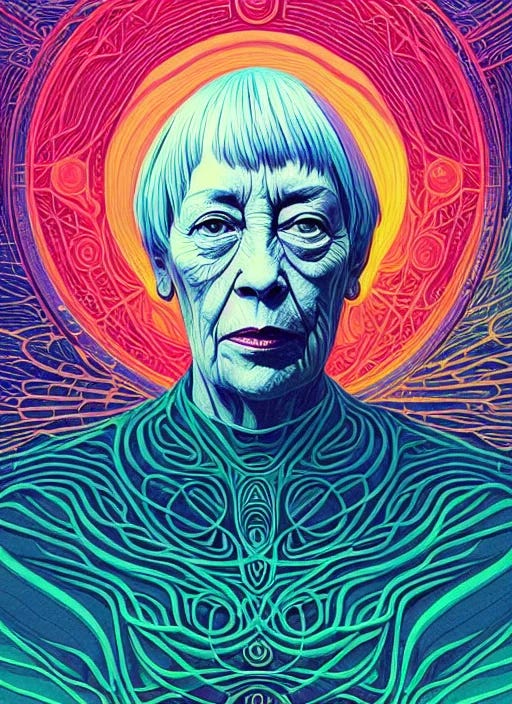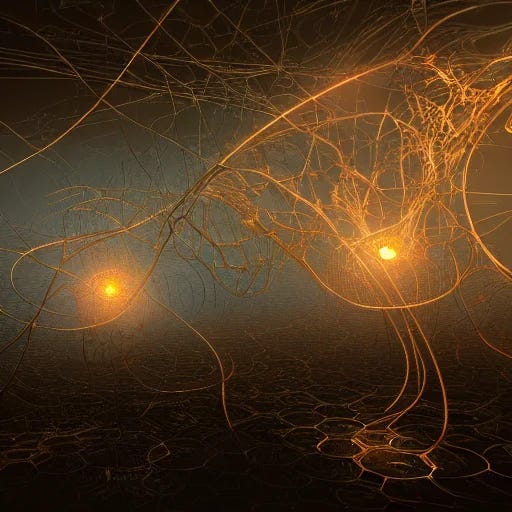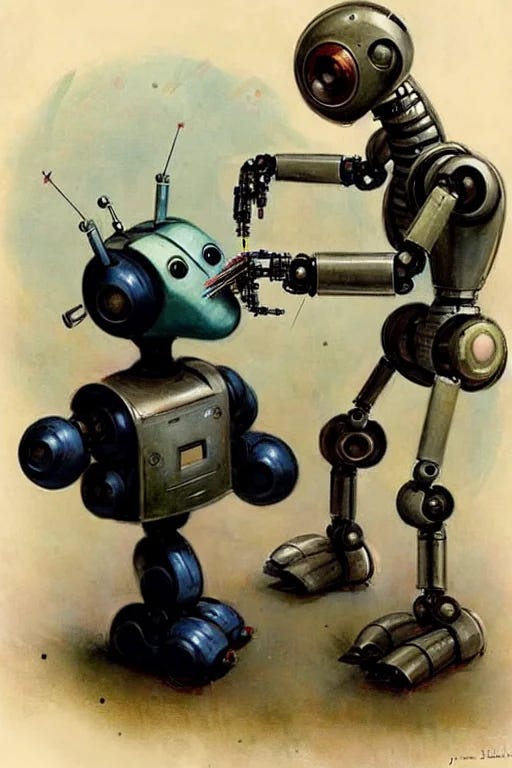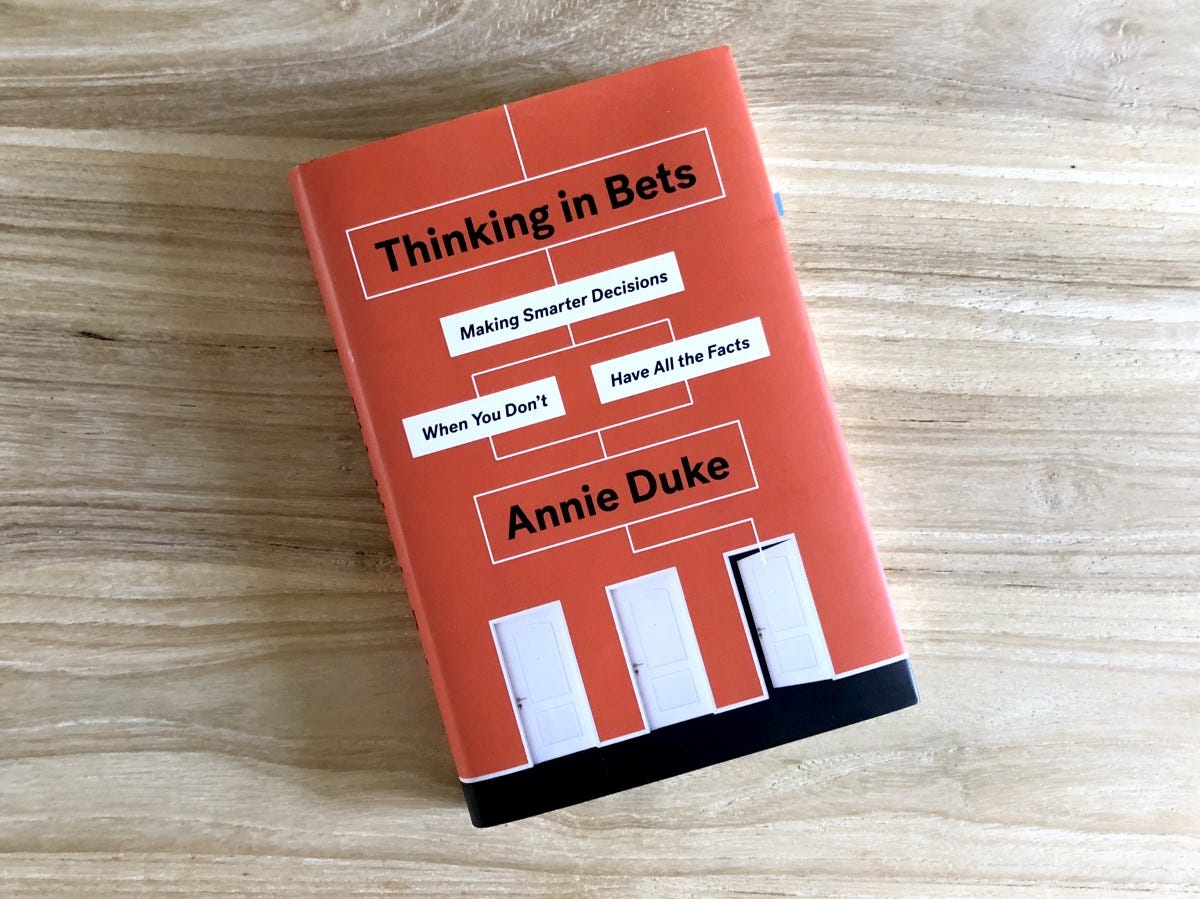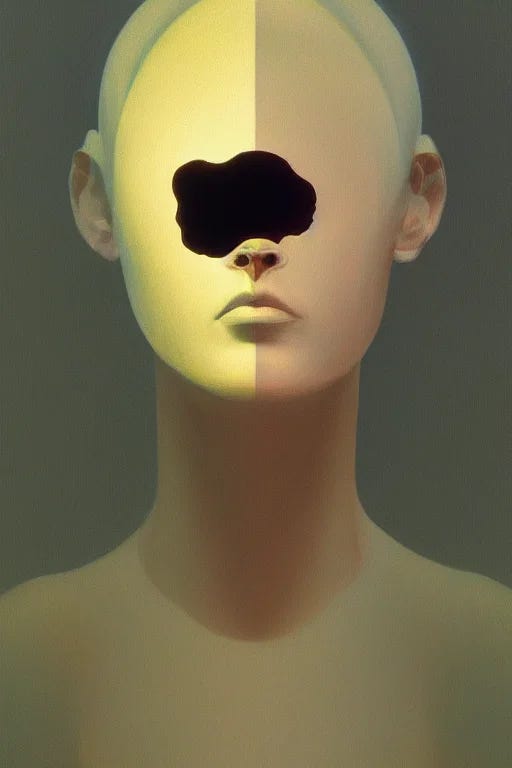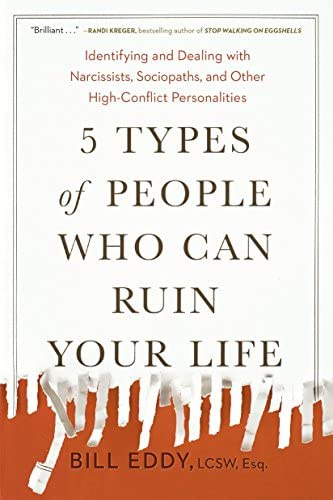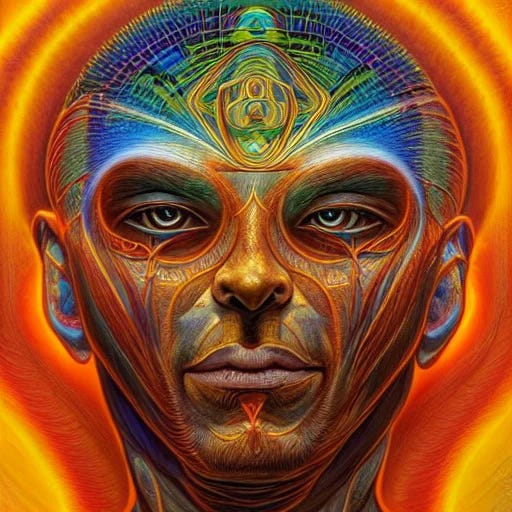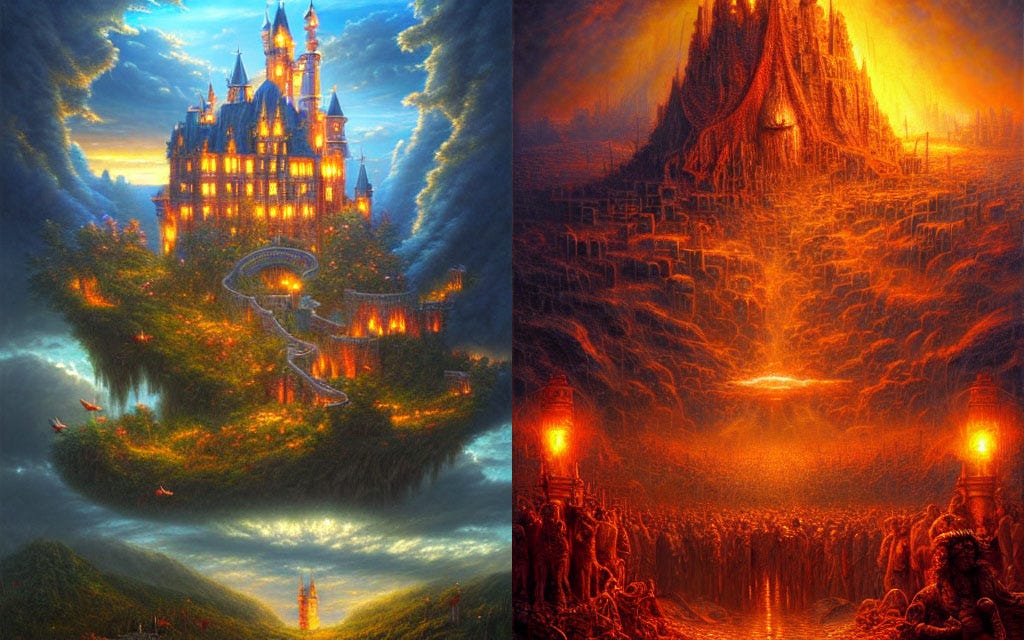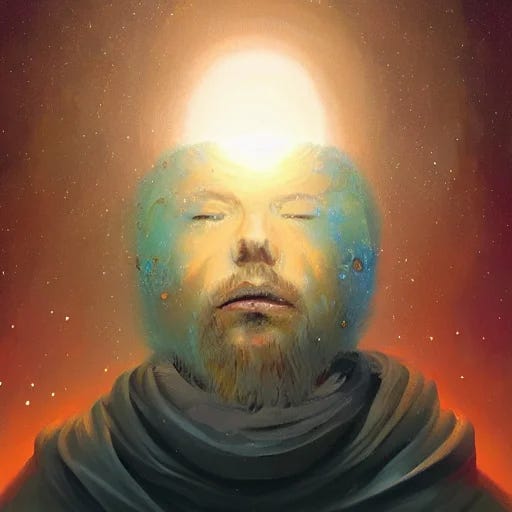The Human OS and How We Make a Heaven or Hell for Ourselves and Others
The Hidden Inner Workings of Our Minds and Why Personality is Destiny
What makes us tick?
What's the "software" that runs inside of us, that lets us learn, feel, form a personality, forge bonds with others, and fight with rival groups? How much of it is firmware or hardware? How much of ourselves can we actually change and how much of our life is totally predestined based on the way our personalities invisibly drive our everyday decisions?
How does our personality form in the first place? Our beliefs? Our values?
Are we bio-machines or something else entirely?
Psychologists and philosophers have sometimes pushed back on the idea that we're anything like machines. And maybe those naysayers are right. On the surface, we can't be any more different from machines.
The way we see the world and learn are very different from AI. Humans have dreams and emotions and each one of us sees ourself as incredibly unique, while machine learning models are static and only good at a few things at most. We learn from just a few experiences and machines take billions of examples to learn just one simple thing.
How we learn those things seems different too. Machine learning models study massive amounts of data and learn a compact representation of the world, compressed into a small amount of neurons. Humans, on the other hand, learn from very little data. I can teach a kid to throw a baseball in a few weeks just by tossing the ball around with him in the backyard. Humans also have neurons to burn and we can spread our learning out across them far and wide.
How many brain cells do we have kicking around in our head? We've got 86 billion. But that's not even the end of the story. A biological neuron and a digital one are not a one to one comparison. Researchers at Hebrew University of Jerusalem, trained a deep neural net to simulate the complexity of a single biological neuron. They showed that it took between five and eight layers of interconnected digital neurons to represent the complexity of just one of our neurons. Even worse, each of those individual brian cells has an average of 7000 connections to other cells. All that means we've got exponentially more compute power packed into our squishy little brains then even the largest exo-scale supercomputers and all of it runs on some bananas and water instead of megawatts of energy.
But are we really all that different from machines?
Past those surface differences we start to look a lot alike.
AI learns from data. But so do we. We learn from experiences and that's really nothing more than data in the form of things that happen to us, mashed together with the data of our emotions, stories we hear and tell ourselves, input signals of biological pain and pleasure, and the stream of thoughts in our heads and the ideas we pick up from others as we move through life.
We also share another learning technique with AI: Reinforcement learning or RL for short. Basically, it's reward and punishment.
And that algorithm, buried deep in our minds, may be the driving force behind our lives.
To understand why you just need to understand a bit about spankings and cookies.
On Pleasure and Pain, Spankings and Cookies
We give a neural net a goal and reward it or punish it with a reward function for getting closer or farther away from that goal.
We have reward functions imposed on us by our parents, lovers, friends, companies, countries, culture and a thousand other factions in life that want to shape us and control us and what we think and feel. Our parents praise us for cleaning our room and punish us for not being a "member of the clean plate club" and finishing our dinner.
Our parents, teachers and society punishes us through physical or psychological pain and rewards us through praise and pleasure. An AI's reward isn't a spanking for being bad or a cookie for doing good but it's the mathematical equivalent of it, deducting or awarding points as the machine hits or falls short of its goals.
Your grade school teachers may reward you for standing in a single file line or punish you for not doing it. Your Twitter network may reward you for showing patriotism towards your country, echoing your flag waving feelings with cheers and uplifting quotes from your country’s historical heroes. Depending on your circle of influences it might reward you for the exact opposite of that too, giving you praise and status for your more international mindset. Your small town may reward you for showing religious piety or being not religious at all, depending on where and when you live. Your partner might get mad at you for not doing the dishes or lavish you with praise when you do.
Our reward functions also change and evolve as we learn. Those functions modify themselves as we get constant feedback from the world around us. When we draw something, friends and family may tell us how good we are and that pushes us to keep drawing. The more joy we get from creating things and from the praise others give us makes that reward function stronger and gives it a more powerful position in the hierarchy of the inner algorithms that drive us. But if our friends frown at our drawings or people tell us we're no good, we may lose interest in drawing and that reward function withers and dies. We quit scribbling on a page because it now feels painful.
If we fall in love with reading at an early age, our hearts and heads flood us with feelings of joy and accomplishment when we're deep in the pages of a beloved book. That's our reward function getting more powerful and taking a more prominent position in our thoughts and ideas. It might get stronger still when we're talking about a great book with a lover or a friend over coffee.
Someone else might fall in love with sports for the same reasons. Maybe it's the rush of adrenaline that makes us feel like we're immortal and indestructible as we surge down field, avoiding tacklers, sweat streaming down our face, as we charge the goal line. The screams of the crowd surround us and their energy picks us up when we get knocked down. We hold our hands high in victory and bathe in the total adulation of the people in the stands (reward) and we bury our heads in shame when we miss the big shot or lose to another team (punishment).
That self-modifying reward function may be the biggest difference between today's AI and us. Machine learning (ML) systems have a small set of reward functions imposed on them by their creators. And they're static. But people have 100s or thousands of dynamic reward functions floating around inside us, driving our behavior invisibly, those functions constantly shifting as we grow and develop, until they solidify into a more stable hierarchy in adolescence.
And once those hidden inner reward functions harden they become the driving force behind our lives and our choices.
They decide what we do, who we love and why, our work, how we spend our time off and more. Like the fixed weights of an AI’s neural net, they make most of our decisions for us.
AI rewards are relatively simple and straightforward. Maybe an ML system just gets points or loses them for learning the rules of Go and for winning games, like Alpha Go Zero. A model might get rewarded for learning how to walk as a robot and punished for stumbling. There's a reason that many RL systems focus on games. They're easier to put into simple mathematical formulas. Win or lose. Land the rocket or don't. Score the goal or don't.
Human rewards are more complex and a lot less objective. They're fuzzy and you never really know if you're actually "winning" at all in life. Somehow we just get the sense that we're moving in the right or wrong direction from that pleasure or pain inside us.
Our rewards may shift over time as the pleasure declines and the pain ratchets up, unlike the static rewards of machines. Many famous young singers get tremendous pleasure from drugs or alcohol when they're young, finding it enhances their creativity or fun. But over time, as they age and as the drugs and alcohol show more and more of their darker effects, that alters the reward function. The pain goes up and the pleasure down, day after day. Some of those singers cling to the old function and eventually join the 27 club of famous musicians who tragically died too early. Others learn to shift what they get their pleasure from and drop the substances, find more balance from other rewards and live to an old age. As Tony Bennet said at the end of the Amy Winehouse documentary, "life teaches you how to live it, if you live long enough," in contrast to the young Winehouse who didn't.
How those reward functions develop inside us depends very much on where and when we grew up and what we experienced. All of that changes and warps us and creates a big constellation of reward functions inside us that exists in a hierarchy. Some of them take on tremendous value and importance to us and others are just minor players, sometimes pushing or pulling us towards one decision or another, but not having as big an influence on our decisions.
Eventually the major reward functions in our minds congeal into what we call beliefs and values.
When we're young our beliefs and values are incredibly fluid but at some point in our development, around the age of 12 or 13, they start to become more set in stone. As we grow to about 3 years old our brains are rapidly expanding and growing during a period neuroscientists call synaptogenesis, but shortly thereafter in life we start pruning neurons and connections and our brains become a lot less plastic.
According to Healthline, "Once the brain forms a synapse, it can either be strengthened or weakened. This depends on how often the synapse is used. In other words, the process follows the “use it or lose it” principle: Synapses that are more active are strengthened, and synapses that are less active are weakened and ultimately pruned. The process of removing the irrelevant synapses during this time is referred to as synaptic pruning."
We like to believe that we're continually learning through our whole life but most people don't. Most folks grow rigid and fixed. They stop learning around 12 or 13 years old, where our brains stabilize and we've formed the vast majority of our major values, beliefs and personality. At that point most of our Human OS, aka our personality, values and beliefs, are "burned in" and become very, very hard to change. Our model of the world is basically trained and rarely adapts except in the most extraordinary of individuals and circumstances.
It's not that we can't rewrite our Human Operating System at that point, it's just that it becomes a lot harder and most of us don't. Once our reward functions congeal into beliefs, our way of viewing, seeing and reacting to the world becomes essentially static. Not only that, we tend to see our beliefs not as representations of the world but as actual fact/reality.
It's these major reward functions inside us and how we go about getting those satisfied that define whether we're a healthy person or unhealthy. It's also how we can spiral into mental illness or severe personality disorders that make our life and the life of those around us a living hell.
And more importantly, beyond our own personal heaven or hell, it's people and their Human OS that form the basic building blocks of the larger collectives that make up our lives and turn the whole world into a heaven or a hell.
Personality is destiny.
And it’s vast collections of personality tribes that form poison tree or hummingbird systems.
Poison Trees and Hummingbirds
What are poison tree and hummingbird systems?
In my article on it, I talked about how growing systems form and how they decay and die. Each of those systems is marked by a distinctive set of characteristics, like open and meritocratic in growing systems and rigid and hierarchical in decaying systems.
Each of those trajectories is characterized by a remarkably similar set of traits, whether that system is a family, a company, a badminton club, a social media tribe or a nation state.
Poison tree systems are decaying and brutal systems. It comes from my idiom "Poison trees make poison fruit," or just "Poison tree, poison fruit," meaning that if the roots and truck of a tree are poisonous the entire system will reflect that poison and it's hard to get a healthy fruit, unless you can rip those trees up by the roots.
The idea of a hummingbird system came to me from the ideas of Stephen Johnson's How We Got to Now, where he coined a wonderful phrase: the Hummingbird Effect. That's where a breakthrough in one area of life leads to unexpected progress in seemingly unrelated domains. I use it to mean any system where the beneficial elements of that system are in ascendance and the effects radiate out in wonderful ways all through the areas around it.
But what I didn't say is that at the root of all those systems is people.
They're the Lego bricks that snap together into larger collectives.
It's those collectives that have a disproportionate effect on our lives and they dramatically influence how the next crop of Human OSes develop because larger collectives develop their own will and their own reward and punishment functions, which influence the individuals inside that system.
Because damaged or healthy personalities tend to attract or repel each other, they tend to form larger groups. In the hunter gatherer days, those were small groups of people, based on the needs and desire to find food and protect each other in the wild. In the modern world, our "tribes" are much, much larger. We form collectives like love relationships, friendships, companies, sports teams, professional organizations, countries and more, all of these nothing but vastly expanded tribes that have shared characteristics. And each of those collectives is a system, influencing and directly much of the smaller individual systems in all of us. They frame and influence the reward functions in each of us and drive our development in specific ways, often causing us to reflect the will of the whole.
Li Cuixin, the famous sci-fi author of the acclaimed Three Body Problem trilogy, said in an interview that democracy wasn't right for China, and individual liberty is "not what Chinese people care about." His views reflected the wider views of the system he grew up in that rewards people for thinking that way and brutally punishes them for deviating from it. He supported policies like the one-child policy and the Xinjiang re-education camps, saying "the government is helping their economy and trying to lift them out of poverty." All of this was driven by the influence of the larger reward functions of Chinese society that favor the collective over the individual and perhaps a bit of fear of retribution from the Party.
His American interviewer, growing up steeped in the mythology of the individual and personal agency, recognized that she had the exact opposite view based on the influence-net of her own circumstances. "[His] was an opinion entirely consistent with his systems-level view of human societies, just as mine reflected a belief in democracy and individualism as principles to be upheld regardless of outcomes."
Within any given collective, there's a push-pull towards a poison tree or a hummingbird dominant system, where each constellation of personalities vie for supremacy in the structure and drive it towards "people like them" at the helm of power in the system. It's these battles of collective personality swarms that lead to damaged and decaying systems or healthy and growing systems. During these push and pull periods, a system may be relatively stable, neither entirely creative and growing or decaying and dying, but balanced between the two, with elements of both dark and light trying to push it in one direction or another.
But eventually every system reaches a tipping point, where the system experiences explosive growth as the hummingbird takes the reins or where it breaks down into increasingly chaotic and destructive systems because the poison trees have spread far and wide.
You might think that only one kind of system is necessary or successful but each kind of system can be successful for a time. The difference is in what ways it's successful and where it fails and also the duration of how long it lasts in that state. There is also a massive quality difference for the periods where dark systems are in power, with individual lives often crushed under the steamroller of the larger will collective.
Uber had a notoriously nasty corporate culture that was characterized by the classic poison tree characteristics of paranoia, rigidity, viciousness, tribalism, hostility, delusional thinking and more. And yet their fiery CEO was a scrapper and a battler who managed to overcome rigid and archaic legal structures in city after city that were designed to protect the taxi unions and lock out all competition. The CEO and Uber still built a global powerhouse of a company that changed the very nature of how we travel all over the world.
The Nazis brought runaway hyperinflation under control, stabilized the economy with price controls, got businesses growing and functioning again and got the trains running on time. If you watch the interviews of people who lived through that time you'll be surprised when you notice that many people thought of it as one of the best times of their lives, when it was contrasted with the dying system they'd just lived through where left-right gangs were battling in the streets openly, businesses big and small collapsed en mass causing massive economic pain for lower and middle class alike, and money was near worthless and nobody could seem to fix anything.
But decaying systems reach a nasty tipping point.
Their beneficial effects are steadily eaten away by the dark undercurrents. Uber was tremendously successful in building an empire but many people found it hell to work there so it wasn't successful in work life balance or personal fulfillment for many of the people behind the scenes and eventually the leadership was purged. Those proud Nazis soon realized the limits of trains running on time as imperialistic ambitions sent them hurtling into a terrible war that engulfed the world, crippled their economy and saw them starting from a broken and ruined society once more.
A poison tree system eventually eats itself with paranoia and pain and suffering. No matter how successful a poison tree system gets there's little doubt that the healthy, growing, balanced systems throughout all time and history, are the ones that most people want to live in if they have the choice. When given the choice between a brutal dictatorship and an open and thriving society most healthy people would choose the open system unless their personality cluster of rewards drove them towards the poison system.
And yet, surprisingly, many people would choose the poison system. Every dictatorship finds ready and willing sleeper agents in society who can't wait for someone to come to power to make it okay to be violent and brutal, so they can unleash their darkest desires of pain, suffering and dominance.
In the famous book, The Brothers Karamazov, Ivan imagines what would have happened if Jesus returned during the dark days of the Inquisition. He realized The Grand Inquisitor would have simply executed Jesus because his message of personal freedom stood against the totalitarian institution of the church at that time. “Nothing has ever been more insupportable for a man and a human society than freedom,” says the master torturer. “So long as man remains free he strives for nothing so incessantly and so painfully as to find someone to worship.”
The Grand Inquisitor and the people in power during the Inquisition loved torture and violence and hatred. They were there all along just waiting for that moment when they could be set free to kill and maim and control.
But what kind of personality is driven towards poison systems? How do we hit that dark tipping point? It seems insane that anyone would "choose" a dark and dying system and yet that's exactly what happens.
That’s because most people don't choose at all.
Our internal model chooses for us.
And that's where we're more alike with machines than we imagine.
If you recall from earlier, I said that we become a static model early in our teens and it's incredibly rare that we change all that much later in life without a tremendous inner will that drives us to keep pushing or learning, or else it’s a powerful event like the death of a friend, or a car crash, a sudden and shocking cognitive dissonance, or the loss of all our money that forces us to change and see differently.
We tend to think of ourselves as free thinking, rational individuals, who make choices based on evidence. But that's not what happens. Most of us are driven unconsciously by our constellation of reward functions in a way that is decidedly deterministic, especially if a person has no self-awareness and doesn’t realize they're a construct, which is most people on the planet at any given point in time.
To change your programming you have to actually know you're a program and most people simply don't. Most people see the world through their model and mistake that model for actual, intrinsic reality. They’re running a fixed and inflexible program, like a non-player character (NPC) in a video game. When there's a difference between reality and what they think, people will do anything to maintain what they think, patching their beliefs to fit what they already believe, cherry picking information and forging it into a chain that binds them to their current way of seeing the world.
People get incredibly uncomfortable when you tell them their beliefs and values are a program or a construct. It's because they don't know they're a construct. Most people can't distinguish what they think and feel from actual reality and when you question or challenge those beliefs they're ready to fight or kill to defend them. In fact, most people would rather die than give up their beliefs and that's how powerful the reward functions in our brains are once they've "burned in.”
It's why people have been dying on the battlefield since the beginning of war and why a monk can set himself on fire in protest and why a person can keep smoking even as they get sicker and sicker and why someone can drink a sugary drink every day despite hurtling inexorably towards diabetes.
In one of my favorite books, Thinking in Bets, world champion poker player Annie Duke shines a bright light on how this strange and mysterious process works.
“Here’s how you think you form beliefs:
We hear something;
We think about it and vet it, determining whether it is true or false; only after that
We form our beliefs.
It turns out, though, that we actually form abstract beliefs this way:
We hear something;
We believe it to be true;
Only sometimes, later, if we have the time or the inclination, we think about it and vet it, determining whether it is, in fact, true or false.”
But Annie is missing something here.
How does our initial beliefs form?
Why do we just hear something and believe it’s true later on in life?
Because we’ve already formed our beliefs and all we’re doing is pattern matching new information to see if it fits inside or outside what we already think is true.
In our early days we form those beliefs through that morphing reward function. Did we grow up religious or patriotic or loving guns or hating them? Did we love technology because every time we touched something mechanical it just made sense and people praised us for how good we were at it?
It's in those moments that our reward functions congeal and freeze into beliefs and it's those beliefs that now determine every other thing we believe.
It's this system of beliefs and self-awareness or lack of self-awareness that attracts us to different kinds of systems. At the root, systems are nothing but shifting, dynamic collections of healthy and unhealthy people.
The systems take on the dominant characteristics of who is in power. A system grows healthy or unhealthy based on which constellation of personalities inside it are driving it towards hummingbird or poison tree dominance. When healthy people rise to the top, the system thrives and grows, as ideas get exchanged and rapidly build on each other, accelerating growth.
When the damaged personalities rise to the top the system begins to decay, as they swiftly purge the creative, healthy people and the decline becomes rapid and painful as the system slides into the abyss or forms a brutal and rigid hell for the people trapped inside it.
Personality Disorders in Modern Life
If you want to avoid or fight against decaying systems you need to pay close attention to personality disorders.
That's because at the root of every decaying, dying and painfully dysfunctional system are powerful personality disorders at the helm of that system.
Personality disorders are when the model in our head goes bad. The combination of our experience, and what we learn, along with how those reward functions in our head get modified and ordered into a constellation with a hierarchy, can all go horribly wrong. Usually it’s a vicious upbringing or terrifying experiences and suffering and sometimes it's just faulty wiring or the combination of all of them. But along the way, a person suffering from a personality disorder begins to see everything through a mental and emotional model that misinterprets everything it sees and hears.
A personality disordered person becomes chaotic, overly emotional, paranoid, delusional, prone to conflict, rage and violence that's physical, mental or emotional, and it distorts everything else they see and do.
All of us filter the real world through our mental and emotional model and our beliefs and values. It changes what we see and experience so that we’re never fully seeing that world as it is. That's how people can read or see something that means the exact opposite of what they think or believe and then cherry pick a few words or phrases from it to confirm their exact beliefs.
But personality disorders take this much further. Whereas most of us just filter and make mistakes about certain things in life, people with personality disorder warp nearly everything they see or hear through a frighteningly black mirror of the world.
The most dangerous kinds of people are what the book Five Types of People Who Can Ruin Your Life calls "high-conflict personalities" or HCPs. These are personalities whose reward functions tell them that pain and conflict are the key to their joy and happiness.
While most people are willing to fight for a few key values and beliefs in their life, most of us shy away from too much conflict. But an HCP craves a fight. They love it. They fight at all costs over the tiniest, most trivial detail. Everything is an all out fight to them.
They fight as a way of life, whether that's a histrionic personality disorder starting whisper campaigns about everyone at the office and seeing everyone as against them, an antisocial personality seeing all people through the lens of dark paranoia and attacking before being attacked, or a borderline personality thinking that every twisting emotion they feel is actual reality so that they're constantly in flux from happy to raging to sad, all in the space of a few minutes.
The authors of the book wrote that book after working in family law. They noticed a pattern where most divorce cases had some pain and conflict but usually resolved relatively quickly without the conflict dragging out forever. But they started to notice certain kinds of personalities that loved to fight. Sometimes it was one of the people in the couple divorcing. Even worse, sometimes it was the lawyer on the opposite side with the HCP disorder. In every one of those cases the battle got nasty, long and brutal. A couple would fight to the death over a lamp that cost $50, wasting $10,000 in legal costs and all the time swearing they would destroy the other person or lawyer at all costs.
When you scale up collections of dark personality disorders, especially in people who are charming and seductive and influential to everyone around them, you begin to get a system tipping towards the poison tree. In an office, personality disorders make everything unstable. You have managers who take credit for everything that goes right and blame everyone else when things go wrong. Stable, useful personalities jump ship and your business is overwhelmed by poison fruit. You never know whether you're going to come into another imaginary conflict manufactured by a paranoid personality who thinks everyone is out to get him, or a narcissistic personality that slows down or derails every project as they make the project about them and their bizarre, shifting and crazy needs.
At the nation state level, as cults of personality come to power, they can demonize whole groups and set entire populations against each other, with everyone frothing at the mouth to destroy the other side and nobody stops long enough to realize that 100s of millions of people "on the other side" can't possible all think alike. It's dark personality clusters that lead us into economic breakdown or war or crisis again and again and again.
Whenever HCPs come to power these people create pain and suffering for themselves and everyone around them. The more power and influence they have, the greater the reach of their pain and suffering. A personality disordered spouse may only make their lives of their partner and children miserable but their influence stops there. A manager in a company with a personality disorder may make the lives of their co-workers and subordinates a living hell. A judge with a personality disorder may destroy the lives of countless people who come before them, delivering harsh sentences for even the tiniest infraction.
But when someone with a personality disorder rises to a position of true power, like a president of an international corporation, or the head of state, they can wreak suffering on a vast and terrifying scale.
Overcoming the Darkness
There is only one thing that changes a poison tree system into a hummingbird system. That's people who don't crave a fight, fighting the scourge of poison trees that have taken over. It's the reluctant warriors who don't give up, despite the thankless and frustrating feelings of hopelessness as they face a majority of poison tree personalities that are spreading and taking over the system from every angle.
For a hummingbird system to win and thrive it takes another kind of distinctive personality to win out over the personality disorders. Let's call it the anti-HCP. It's a personality that doesn't love a fight but will fight when necessary to take a stand against the people who love conflict and destruction, overcoming and outmaneuvering them at every step.
There's a single characteristic that drives the most healthy personalities in the world:
Self-awareness.
I call these SRPs. Self-reflective personalities.
That's a person who knows their personality is a construct. These are people who can deconstruct their construct. They can see through the programming they've received. They recognize that in many ways we’re nothing but a series of random toggle switches, flipped throughout our lives, the collective training and influence of friends, family, lovers, the kids at school, nations, companies, experiences and more. A self-aware person sees those invisible lines of influence working in them and they question them, asking whether that influence lines up with their external experience of reality. These are personalities that find a way to continually learn in life, to disrupt their old programming and retrain their model.
But it's not just self-awareness. For a long time, I thought that self-awareness was enough.
I assumed that anyone who could see with self-awareness would naturally and inevitably change and alter their construct. But I've learned through painful experience that it’s not true.
Self-awareness is only the first step.
It's entirely possible to have self-awareness and yet go right back to sleep because it's painful to change.
I've come across a state leader and business leaders and professionals and friends and people in terrible relationships who seemed to have tremendous self-awareness only to slip right back into unconscious automatic function mode.
That's because actualizing self-awareness means massive and total change. I call this self-action. Self-awareness without self-action is meaningless.
Self-action means you have to wake up and take real concrete action in the real world.
Most people don't because that change is often painful and means real loss. As a personality that's randomly formed, it means that many aspects of your personality are malformed, incomplete or broken and that means they need to get rewritten. And there is no amount of standing in place and praying and meditating and spinning in a circle or wishing for that change that will make it happen.
Real change means real action in the real world.
It means you'll have to divest yourself of the poisonous personalities you collected along the way, the ones that were attracted to your own damaged personality traits. It could mean changing a career that's broken and not right for you anymore or was never right for, leaving a lover or a marriage that's toxic and crippling your growth, cutting off a relationship with a parent or child, firing people, closing down a business, giving up money and status, losing contact with friends, children, pets and a thousand other painful and difficult changes.
But it's these self-action oriented personalities that rise to the top in hummingbird systems. They make the difficult changes in their lives, continually learning and updating their own inner software and reward functions, and then move on to help the collectives they influence as a whole.
When enough of these personalities come to power, they attract more people like them and it becomes a virtuous circle that eventually drives out the poison tree personalities and tips the system back into a thriving, stable, creative system that grows and benefits the widest variety of people within it.
Heaven and Hell
If you've ever wondered why a friendship, a love relationship, a marriage, a team, a company or a nation goes into deep decline and decay, it's not complicated. It's the collection of personalities behind it. Any group is made up of people.
When people say they trust an organization or an institution, what are they really trusting? The people behind it.
An institution is really nothing at all, just a bunch of people. If the people in power change, its trust may go into rapid decline.
At one point the police in Germany were trustworthy and upholding the law in the 1920s and 1930s and then as Hitler rose to power those cops were replaced by brutal and ruthless killers who upheld a dark new set of laws. As the people behind an organization change, trust changes with it. At one point Enron was a trusted energy stock and then it was a massive fraud. In the past, tech folks saw Microsoft under Gates and Balmer as the evil empire who crushed competitors but now Microsoft is run by a new leader who embraces outside technologies and has transformed the business into a well respected cloud, gaming and services empire.
Trust is a moving concept. It's never fixed. It's ever shifting as the personalities behind it fight for control and gain or lose power.
Of course, it might not always be obvious to everyone whether a system is tipping towards growth or decay. Part of the function of our mind is to believe we can see perfectly clearly at all times, that our values or beliefs are true and that we know what's right and wrong. But if everyone thinks that it can't possibly be true. If you ask 100 people in a room if they're above average drivers almost everyone will raise their hand but it's impossible for everyone there to be above average. Delusion is part of the construct of our mind and takes center stage for most people most of the time.
That's how the left can look at the right and see everyone there as pure evil and the right can do the same as the left. It can't possibly be true that everyone on the other side shares the same motivations, opinions, and ideas but it's easier to believe 150 million people are the same because nuance is hard.
Of course, some people can't recognize decay for the very reasons they can't recognize their own personality disorder. It's built into the way their mind works. They look at something filled with light and life and see it as death and destruction. Their inner mirror flips everything to its opposite. That's the nature of delusion. It sees what it wants to see.
Everyone imagines they're fighting for good even when they're not. The Devil never says, come fight for evil. He says, come fight for good and the other side is evil.
So can anyone actually tell whether they're in a growing and thriving environment or a decaying one?
The key markers are the outputs. They never lie. Fear and rage are the dominant emotions of a dying system and joy is the dominant emotion of a thriving one.
Joy is different from pleasure. It’s a combination of work and pleasure. A workout may be hard but at the end of it I feel energetic and satisfied and ready to take on the day. That’s joy. Pleasure is simpler. I might get it from eating a cookie or making love but it doesn’t take any real work at all.
If a group is producing more fear, paranoia, confusion, uncertainty, violence, sadness and depression it's a dying system and one you should look to leap out of as quickly as possible. If it's producing joy, pleasure, creativity, and collaboration it's a growing and healthy system.
Again, both kinds of systems can be successful but if you have a choice why wouldn't you choose a system where the vast majority of players are happy and healthy versus paranoid and tense?
When you find yourself in a poison tree environment that you can’t escape then you've got to survive and find a way out. But long and hard is the way out of darkness and into the light. To get there takes massive determination and self-reflection, followed by self-action that means painful and deep change.
If you can’t find a way out then you may have no choice but to fight to turn the system around. And some things are worth fighting for, some relationships, some countries, some companies.
Only you can know the difference.
And only if you can rise above your autonomous programming so you’re not walking through life like an NPC, running a static script. To do that takes the hard and thankless work of becoming self reflective and making difficult changes in your life.
Without action those changes never happen. It's not enough to realize something is wrong. You have to do something about it. You have to take action in the real world and that's hard because it often means sacrifice and loss and suffering. It's strange that getting to a thriving place that creates joy and makes people happy requires suffering and loss but that's the nature of reality too. When you find yourself in the wrong place, with the wrong people, at the wrong time, only a painful shift can get you out of that place of suffering or make a difference in turning the system around for everyone.
Making that shift is worth it. It shortens the suffering to its bare minimum. The faster you can climb back up to the light and leave behind the poison trees, the less your pain and suffering. But the longer you stay, the more it's magnified and to get out of it later still requires that painful shift. It's the price of passage to a new world so make that choice as soon as you wake up long enough to see it.
And then you'll have passed through the eye of the needle that few ever pass through and you'll find yourself with agency.
That means you can make your own choices and create your own destiny. Personality may be destiny but those who can alter their personality and change it for the better create a new destiny.
Self awareness. Self action.
Choosing your own path. Making your own choices with eyes wide open.
And it's those billions of little choices along the way that create a heaven of hell or a hell of heaven.


